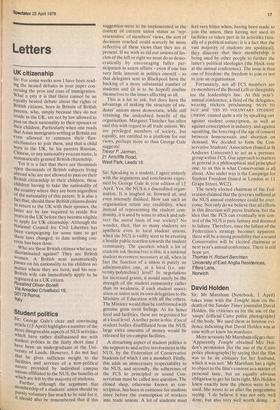Student politics
Sir: George Gale's clear and convincing article (15 April) highlights a number of the more disagreeable aspects of NUS activities Which have rather disillusioned me with student politics in the fairly short time I have been an undergraduate at the University of Leeds. However, '1 do not feel that he gives sufficient weight to the facilities and services of a non-political nature provided by individual campus unions affiliated to the NUS, the benefits of Which are felt by the majority of students. Further, although the argument that membership of a students' union should be Purely voluntary has much to be said for it, it should also be remembered that if this suggestion were to be implemented in the context of current union status as 'representative' of members' views, the sort of decisions reached could scarcely be more reflective of these views than they are at present. If we wish to rid our unions of fascists of the left or right we must do so democratically by encouraging fuller participation in union affairs — even if one has very little interest in politics oneself — so that delegates sent to Blackpool have the backing of a more substantial number of students and (it is to be hoped) confine themselves to the issues affecting us all.
This is a lot to ask, but does have the advantage of making the structure of students' unions more democratic, while still retaining the undoubted benefit of the organisation. Margaret Thatcher has often said this with regard to all trade unions. We are privileged members of society, but equally, are entitled to a platform for our views, perhaps more so than George Gale suggests!
Trevor P. Jarman, • 21 Amcliffe Road, West Park, Leeds 16 Sir: Speaking as a student, I agree entirely with the arguments and conclusions expressed by George Gale in your edition of 15 April. Yes, the NUS is a discredited organisation. It is laughed at, frowned at, and even intensely disliked. How can such an organisation retain any credibility, when instead of representing the student community, it is used by some to attack and subvert the moral basis of our society? No wonder, then, that so many students are apathetic even to local student unions, when the NUS is visibly seen to be creating a hostile public reaction towards the student community. The question which a lot of students ask themselves is this: is a national student movement necessary at all, when in fact the function of a union is purely an administrative one, at a local (i.e. university/polytechnic) level? In negotiations for increased grants, it would surely be the strength of the student community rather than its weakness, if each student associ ation or union sent its own delegation to the Ministry of Education with all the others. The Minister would thus be confronted with genuine grass roots feelings. As for better food and facilities, these are negotiated for at a local level. Another point is this: if local student bodies disaffiliated from the NUS, large extra amounts of money would be released for on-campus facilities.
A disturbing aspect of student politics is the support to and active involvement in the NUS, by the Federation of Conservative Students (of which I am a member). Firstly, this adds an unnecessary respectability to the NUS, and secondly, the adherence of the FCS to principled or sound Conservatism must be called into question. The closed shop, otherwise known as conscription, has been in existence for students since before the conscription of workers into trade unions. A lot of students must feel very bitter when, having been made to join the union, then having not used its facilities or taken part in its activities (usually of a political nature; it is a fact that the vast majority of students are apolitical), they discover that their membership is being used by other people to further the latter's political ideologies (the block vote at the annual conference). The issue is thus one of freedom: the freedom to join or not to join an organisation.
Fortunately, not all FCS members are ex-members of the Broad Left or sheepishly toe the leadership's line. At this year's annual conference, a third of the delegates, wearing stickers proclaiming 'NUTS TO NUS' and 'YES TO VOLUNTARY STUDENT UNIONS', caused quite a stir by speaking out against student conscription, as well as against conscription in industry, and against squatting, the lowering of the age of consent between homosexuals and abortion on demand. We decided to form the Conservative Students' Association (based at St Andrews University) to act as a pressure group within FCS. Our approach to matters in general is a philosophical and principled one: to us this is what Conservatism is all about. Also under way is the Campaign for Student Freedom (based in London at 11 Grape Street, WC2).
The newly elected chairman of the Federation claimed that the reverses suffered at the NUS annual conference could be overcome. Not only do we believe that all efforts in this direction will prove fruitless, but the idea that the FCS can eventually win control of the NUS is pure fantasy and doomed to failure. Therefore, once the failure of the Federation's strategy becomes apparent, there will be a strong possibility that a sound Conservative will be elected chairman at next year's annual conference. There is still hope yet.
Thomas H. Robert Berchten University of East Anglia Residences, Fifers Lane, Norwich


































 Previous page
Previous page